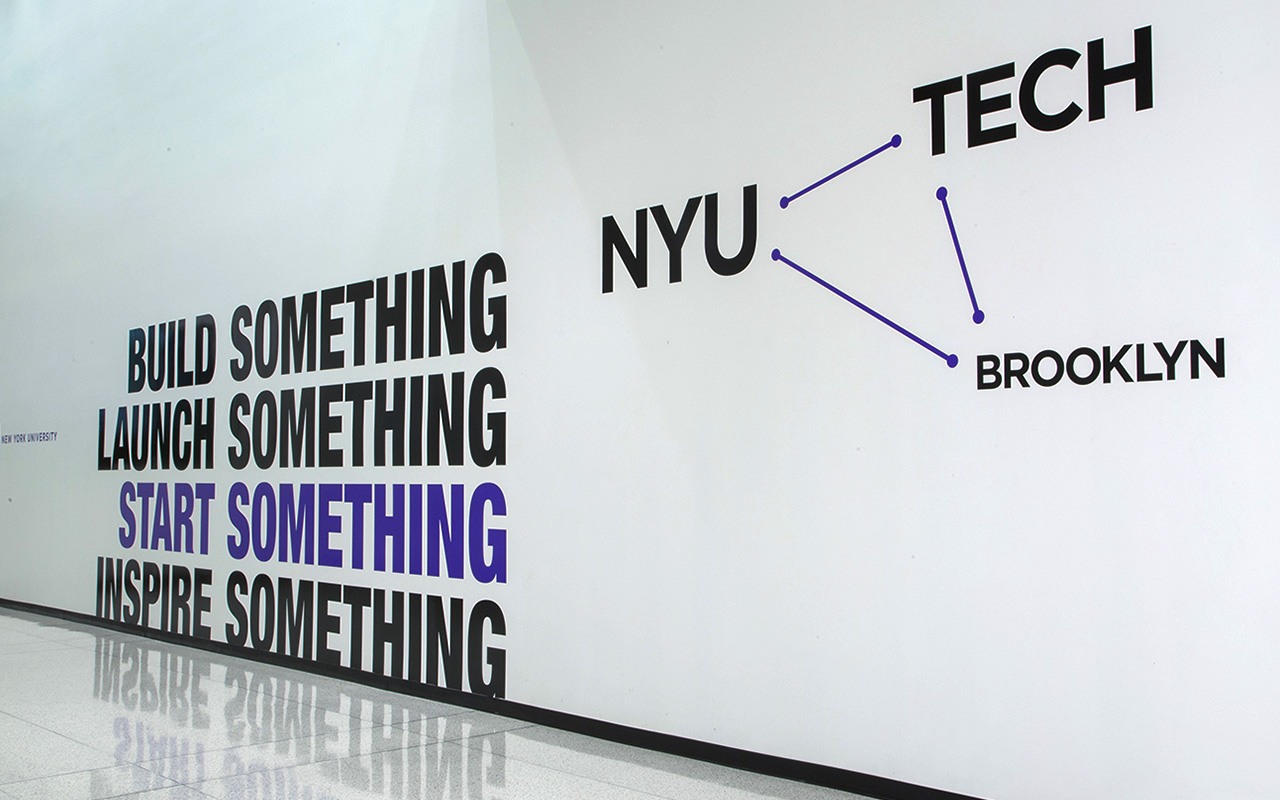Published December 29, 2021
How to Be a Dreamer and a Doer: Business Studies for Every Major

Studying business is often seen as a single pathway leading to a predefined set of careers in finance, accounting, and management. But creativity and practicality are not mutually exclusive. Communication, leadership, and critical thinking skills and financial savvy flow into nearly every field, from the music industry to environmental activism. At NYU, you can shape a path to a career doing what you love by bringing business studies into your major or minor. Doing so adds a practical dimension to your studies while still leaving plenty of room to explore.
If you’re ready to dive fully into the business world, the Stern School of Business offers three majors and 13 concentrations. But there are also plenty of opportunities to combine business studies with other paths. You can focus on the business angle of your creative pursuit within the major. Or you can add a business-related minor to introduce some career focus to your undergraduate studies.
No matter what field sparks your interest, business acumen can set you up for success. Read on for more ways you can use business studies to bolster your undergraduate journey.

The STEM Student
Science and technology intersect with business in new and exciting ways every day. The Tandon School of Engineering’s BS in Business and Technology Management (BTM) degree exists at the intersection of business, technology, and innovation. The program creatively fuses modern business administration with state-of-the-art technology management. Students have gone on to many positions such as project leaders, entrepreneurs, venture capitalists, financial analysts, and marketing managers.
“Having a major that brings together the best of two exciting fields is one of the most unique things about being a business student at the engineering school,” says Eshika Patel, a BTM major. She has built bonds with the small but tight-knit community of business students within Tandon. “Today’s technology-infused industries require a certain amount of technical literacy. By pursuing my degree with science, technology, engineering, and math (STEM) students, I am able to have different experiences that traditional business students may not have.”
Within Stern the BS in Business, Technology and Entrepreneurship (BTE) program combines technology and business studies with an emphasis on entrepreneurship. “This program strikes a unique balance of study through which business students foster an entrepreneurial mindset while also gaining the technological competencies to create solutions for the 21st century,” says program director and Stern professor Ashish Bhatia.
BTE majors immerse themselves in New York City’s tech and entrepreneurial scene. They have the chance to visit powerhouses like Google and Twitter as well as smaller start-ups pushing the frontiers of innovation. In their final year, they work directly with early-stage start-ups or build their own ventures. “Equipped with an entrepreneurial mindset and an impressive fluency in business and technology as well as New York City as their headquarters, BTE graduates will be ready to confidently pursue bold ideas as soon as they graduate,” Professor Bhatia adds.
Several Stern business concentrations also cater to STEM interests. The computing and data science concentration provides needed skills in a plethora of industries. For example, the insurance, retail, media, health care, education, travel, advertising, and automotive fields. A talent for math can be channeled into concentrations such as finance, statistics, and econometrics and quantitative economics. Undergraduates can also take courses within the Business of Entertainment, Media, and Technology minor program.

The Humanities Scholar
Areas of study that may seem the furthest removed from business may overlap it more than you think. Today’s complex corporate environments require cultural awareness, critical reading skills, creative and logical thinking, solid writing proficiency, and the ability to understand and interact with people. A humanities education develops these skills and more.
Humanities students study facets of humankind itself, applying critical thinking and unique investigative techniques to the field. The curriculum encompasses liberal arts studies such as English, history, philosophy, and languages. Those skills are valuable in nearly any industry. And when they’re combined with the analytical skills provided by business studies, they form a well-rounded foundation for a wide range of careers.
The Business Studies minor at the College of Arts and Science is available to all undergraduates. What’s more, it is specially designed to complement humanities studies. Classes cover topics such as statistics, accounting, and management. And you can take a host of electives within Stern. The core knowledge and quantitative skills you’ll gain are invaluable professional assets.

The Creative
If you’re drawn to a creative field, adding practical business skills to your studies can help you approach your passion in new ways that can lead to a long and rewarding career.
The Business of Entertainment, Media, and Technology (BEMT) is one of NYU’s most popular minors. It’s offered through Stern but available to all NYU students. BEMT professors are active participants within the industries they’re teaching. Classes cover topics such as marketing, social media, economics, and management in fields including film, theatre, sports, publishing, and video games.
“Studying entertainment, media, and technology with industry leaders and analysts was the right balance of informational and challenging. It allowed me space to propose my own ideas about the material I was learning,” says Sarah McReynolds, who minored in BEMT. “I was able to learn from a range of perspectives on the same subjects. Importantly, though, my BEMT coursework was never limited to the classroom. Opportunities for networking, lectures from outside speakers, and events happening in the city constantly surrounded me.”
Even if you don’t pursue the minor, you can explore any of these topics by taking the courses as electives. “The range of students in the program created an incredible learning environment where everyone brought different ideas to the table,” Sarah says.
At NYU Shanghai, the Interactive Media and Business (IMB) major teaches students how innovative ideas combine with technology, creativity, and business principles to result in new products, services, and experiences. When asked why he enrolled in the IMB major, Erdembileg Chin-Erdene says, “I realized that my interests lie in creating solutions to real-life problems using technology. Like an app I developed to fight food waste that tracks what ingredients the user has in their pantry and suggests recipes based on them. Plus, Shanghai was the perfect environment for pursuing a major like IMB. There’s inspiration everywhere for new products and ideas.”
If you’re fully committed to your artistic craft but still want to build practical knowledge of the business side of your industry, consider the following options. Screen buffs can apply for the Business and Film and Television dual degree, which grants degrees from both Stern and the Tisch School of Arts. Tisch students can also check out minors in Film and Producing, which offer business-focused electives. “Knowing about finance is powerful, especially as a woman in business,” says Natalia C. Bell, a 2019 graduate of the dual-degree program. After graduation, she worked in strategy and business development at Focus Features. Now she makes her own films while working as an analyst at the New York Times. She credits combining film and business classes with helping her develop “a highly flexible mind.”
Musicians, meanwhile, can apply for Steinhardt’s Music Business program. This degree combines music education with Stern classes and takes advantage of NYU’s dynamic location in the heart of the music industry.
The Environmental Activist
Increasingly, consumers seek businesses that minimize their effects on the environment and create positive impact with their products and services. The sustainable business concentration at Stern takes a unique look at how green business practices are good for the environment and the bottom line.
Natalie Aresta-Katz was already running her own small soap-making business when she enrolled at Stern. Through her classes, she says, she “started realizing just how important it is for companies to consider their impact. Not just on the environment but on their workers and communities.” She strives to make sure her soaps use only sustainable palm oil and other ingredients. “Every sustainability class I’ve taken at Stern has been absolutely incredible,” Natalie says.
Additionally, all Stern undergraduates get a chance to consider the wider repercussions of business on the planet and society through the Social Impact Core. The curriculum consists of four courses designed to immerse students in fundamental issues facing society—and how business can help solve them.

The Global Citizen
Business can be a way to transcend cultures and borders. And several NYU programs cater to students seeking out business studies and a global perspective.
Stern’s Business and Political Economy (BPE) degree lets you experience the world while you learn about the interactions between politics, business, and economics on a global level. You’ll spend at least two semesters abroad—one in London and one in Shanghai. And you have the option to spend a third at the NYU global site of your choice. Classes covering political theory, comparative politics, and international relations stress the challenges of globalization alongside an internationally focused business and economics curriculum.
Other programs also give you the opportunity to study business foundations overseas. The business program at NYU Shanghai will prepare you for the modern globalized business world. Add a Business minor to your chosen field or major in Business and Finance or Business and Marketing. Each option provides a deeper understanding of the modern international business environment and its economic structure.
If you’re more interested in letting the world come to you, consider the BS in Hotel and Tourism Management at the School of Professional Studies (SPS). All the business studies angles are covered. You’ll learn about marketing, human resource management, business development, and more from a hospitality and tourism perspective. In addition, you’ll learn the ins and outs of the hospitality industry in a city that hosts millions of visitors a year. Sophy Martorell, a Hotel and Tourism Management major, interned with Starwood Hotels and Resorts Worldwide in the spring of her first year at NYU. She went on to intern with W Hotels, St. Regis Hotels, Sheraton Hotels and Resorts, and The Plaza. “If you utilize all the opportunities you have at hand in New York City, there’s no limit to what you can experience,” she says.
The BS in Real Estate is another program that takes advantage of New York City’s unparalleled opportunities. The degree combines business fundamentals with an in-depth exploration of the intricacies of the real estate market. “The Schack Institute Real Estate major is centered on creating global citizens who care about the built environment and want to make a positive difference in the world where we live, work, and play,” says Clinical Assistant Professor of Real Estate Development Brian G. Schwagerl.
The Sports Aficionado
Athletes and superfans can turn their love for the game into a lifelong pursuit by diving into the business of sports. A BS in Sport Management at SPS can take you behind the scenes of the industry.
New York City is home to eight major sports franchises, the headquarters of every major North American sports league, and countless sports agencies, marketing firms, and tech start-ups. “After doing my research on the program’s professors and the companies, teams, and leagues they work with, I knew studying the business of sports in New York City would be a once-in-a- lifetime opportunity,” says Aggie Dent, an alum from Birmingham, Alabama.
Interdisciplinary classes include International Sports Law, Consumer Behavior, Foundations of Global Sport Management, Financial Management and Accounting in Sport, and Digital Media and Marketing in Sport. The program serves as an industry-specific vertical. It will give you a solid foundation for any direction you take in the sports business.
Even More Angles
A dash of business acumen can be the secret ingredient in your recipe for success. Here are additional ways to incorporate business studies into your interests.
- Economics at the College of Arts and Science, NYU Abu Dhabi, and NYU Shanghai
- 13 concentrations at Stern, from entrepreneurship to operations
- Recorded Music at Tisch
- Global Public Health and Food Studies at Steinhardt



